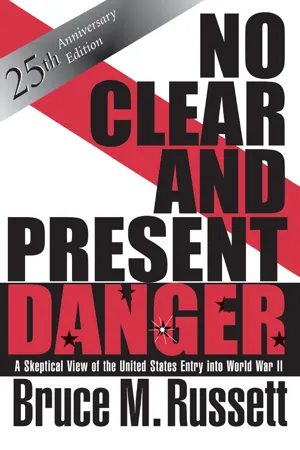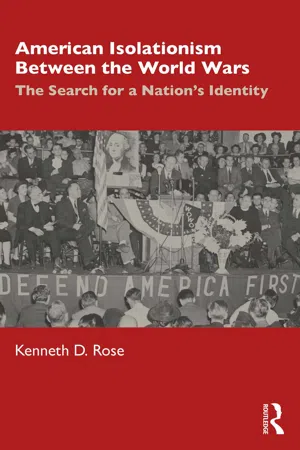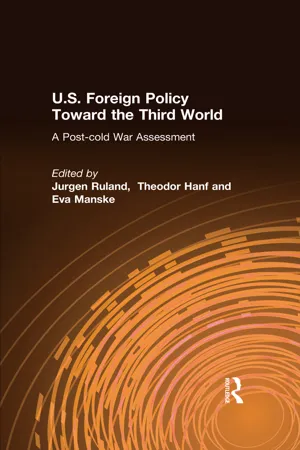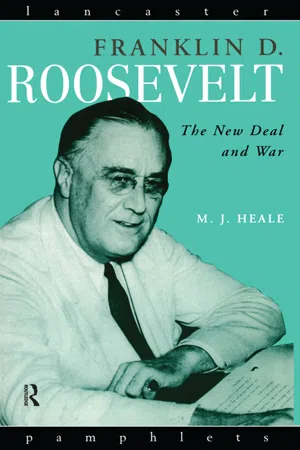American Isolationism
American isolationism refers to the United States' historical tendency to avoid entangling alliances and involvement in foreign conflicts. This policy was particularly prominent in the period between World War I and World War II, when the U.S. sought to distance itself from European affairs. Isolationism was driven by a desire to focus on domestic issues and avoid the costs and risks of international entanglements.
7 Key excerpts on "American Isolationism"
- eBook - ePub
- Gregory Claeys(Author)
- 2013(Publication Date)
- CQ Press(Publisher)
...Justus D. Doenecke Justus D. Doenecke Isolationism Isolationism 445 446 Isolationism Isolationism, a long-standing strain of U.S. political thought, has traditionally been defined as a refusal to participate in wars outside the Western Hemisphere, particularly in Europe; an opposition to binding military alliances; and lack of participation in organizations of collective security. Above all, the “isolationist” desires to maintain the United States’ autonomy, a freedom of action unhindered by the policies of allies. Such people often differ from pacifists, those who would renounce any war and withhold backing for any conflict. Proponents of the isolationist position usually reject the label, finding it derogatory. As most isolationists oppose “isolating” the United States from either the world’s culture or its commerce, they have long preferred such terms as “neutralist,” “nationalist,” “noninterventionist,” or “anti-interventionist.” Isolationism centers on the belief that foreign alliances and overseas military involvements would invariably weaken the United States. Those on the right warn against prohibitive taxes, regimentation of the economy, and the loss of classic “republicanism.” Those on the left fear the advent of a garrison state that would obliterate social reform and abolish civil liberties. In either case, the nation would inevitably be weakened, perhaps irreparably so, and risk military defeat. From 1776 through the early twentieth century, the nation has pursued an isolationist foreign policy. The stance was articulated in such documents as Thomas Paine’s Common Sense (1776), John Adams’s Model Treaty (1776), George Washington’s Farewell Address (1796), Thomas Jefferson’s First Inaugural Address (1801), and James Monroe’s annual message of 1823, in which the fifth president proclaimed the Monroe Doctrine...
- eBook - ePub
American Civilization
An Introduction
- David Mauk, Alf Tomas Tønnessen, John Oakland(Authors)
- 2021(Publication Date)
- Routledge(Publisher)
...Chapter 8 Foreign policy A nation apart? American attitudes to world affairs From neutrality to isolationism, 1776–1830 From expansionism to imperialism, 1783–1914 Isolationism and internationalism, 1914–45 The Cold War era, 1946–92 The sole superpower in the post–Cold War era and beyond The foreign policy establishment debate Exercises Further reading Websites A nation apart? American attitudes to world affairs “America First!” shouted Donald Trump throughout his campaigns and term in office. The foreign policy of all nations puts the homeland’s vital interests first, but Trump’s narrative rested on the belief that since the Second World War, US leaders had failed the nation because they made poor “deals” that allowed other nations to take advantage of the country. In his first month in office, President Joe Biden proclaimed “America is back” to emphasize his intent to reaffirm the country’s support for human rights and revitalize the multilateral alliances of the US after the Trump administration’s criticism or withdrawal from several international agreements. In fact, the foreign policy of the US, like that of all nations, has been a mixture of self-interest and attempts to act according to the population’s commonly held ideals. One factor that makes America’s foreign policy distinctive is the size and strength of the nation relative to other nations at critical times in its history. In the beginning of its history, the US, then a weak and inconsequential actor on the world stage, emphasized what the American political scientist Joseph S. Nye terms “soft power” (attracting support by example, ideals and diplomacy) to the near exclusion of other means of handling international affairs...
- eBook - ePub
No Clear And Present Danger
A Skeptical View Of The UNited States Entry Into World War II
- Bruce M Russett(Author)
- 2018(Publication Date)
- Routledge(Publisher)
...1 Isolationism Old and New The “lessons” of history Whatever criticisms of twentieth-century American foreign policy are put forth, United States participation in World War II remains almost entirely immune. According to our national mythology, that was a “good war,” one of the few for which the benefits clearly outweighed the costs. Except for a few books published shortly after the war and quickly forgotten, this orthodoxy has been essentially unchallenged. 1 The isolationists stand discredited, and “isolationist” remains a useful pejorative with which to tar the opponents of American intervention in foreign lands. Such virtual unanimity on major policy matters is rare. World War I long ago came under the revisionists’ scrutiny. The origins of the cold war have been challenged more recently, with many people asking whether the Soviet-American conflict was primarily the result of Russian aggressiveness or even whether it was the inevitable consequence of throwing together “two scorpions in a bottle.” But all orthodoxy ought to be confronted occasionally, whether the result be to destroy, revise, or reincarnate old beliefs. Furthermore, this does seem an auspicious time to reexamine the standard credo about participation in World War II. Interventionism is again being questioned and Americans are groping toward a new set of principles to guide their foreign policy. Where should we intervene and where withdraw; where actively to support a “balance of power” and where husband our resources? A reexamination of the World War II experience is deliberately a look at a limiting case—an effort to decide whether, in the instance where the value of intervention is most widely accepted, the interventionist argument really is so persuasive...
- eBook - ePub
American Isolationism Between the World Wars
The Search for a Nation's Identity
- Kenneth D. Rose(Author)
- 2021(Publication Date)
- Routledge(Publisher)
...While both Britain and France toyed with the idea of recognizing the Confederacy (Britain went so far as to allow the construction of Confederate vessels in British shipyards), in the end both wisely backed off and avoided intervening in American political affairs. In the context of 1919 (and resisting the impulse to look twenty years into the future), it is hard to argue against the reasonableness of the isolationist position. The British critique of American Isolationism was especially rich, leavened as it was with more than a dollop of hypocrisy. In fact, the United States was now pursuing a strategy that had defined British foreign policy for much of the nineteenth century. In 1896 British Prime Minister Robert Salisbury told Queen Victoria that isolation posed “much less danger than the danger of being dragged into wars which do not concern us.” In the same year, First Lord of the Admiralty Edward Goschen insisted that, “Our isolation is not an isolation of weakness, or of contempt for ourselves; it is deliberately chosen, the freedom to act as we choose in any circumstances that may arise.” 109 Another political leader claimed that the nation had never been isolated commercially, financially, or socially, but only in the sense “that we have not bound ourselves by alliance to mix up in the quarrels of others—only in the sense that we have attended to our own business. Is not that kind of ‘isolation’ the very thing that is best for us and the world?” 110 In this case, however, the politician was former American senator Albert J. Beveridge, and he was making his comments in 1919. Britain’s involvement in the affairs of continental Europe after the war was reticent at best. Arguably, America’s rejection of a military alliance with Britain and France was a godsend for British statesmen because it gave them license to abandon France and instead revert back to the 500-year-old strategy of playing one continental power off against another. British historian A. J. P...
- eBook - ePub
The United States and NATO
The Formative Years
- Lawrence S. Kaplan(Author)
- 2021(Publication Date)
- The University Press of Kentucky(Publisher)
...3. Isolationism, the United Nations, and the Cold War, 1947–1949 The experience of World War II taught Americans that the price the nation had paid for its isolationism in the 1930s was too high. They learned that war might have been avoided had the United States been able to accept the principles of collective security. But even as this knowledge impressed itself upon policymakers, the Roosevelt and Truman administrations recognized the difficulty of uprooting an entrenched idea. Political abstention from the Old World meant American freedom from the evils of spheres of influence, alliances, and balance-of-power struggles. The fate of Woodrow Wilson’s attempt to bring the United States into the League of Nations was instructive to the makers of foreign policy during the war and postwar years. If America should break with the traditions of Washington or Monroe, the break would have to be in consonance with the spirit of the past, so that identification with Europe would not be identical with the immoral European system of international relations. It was for this reason that the United Nations became such an important part of American policy in the 1940s. It would be America’s chance to redeem the error of 1919 and to do so on its own terms. That is, the United Nations, under American auspices, would not only make another world war impossible but would guarantee security by means of America’s traditional practices, or at least what it liked to consider to be its true approach to international affairs—conciliation, mediation, and use of international law. It was not important that the new league was in fact less powerful than the old on paper. It was important simply that America had embraced the world without embracing the destructive power politics of the past. To President Roosevelt and his advisers, the successful making of a world organization was second in priority only to the winning of the war. Their plans succeeded magnificently...
- eBook - ePub
U.S. Foreign Policy Toward the Third World: A Post-cold War Assessment
A Post-cold War Assessment
- Jurgen Ruland, Theodor Hanf, Eva Manske(Authors)
- 2016(Publication Date)
- Routledge(Publisher)
...2 American Foreign Policy Between Isolationism and Internationalism, Unilateralism and Multilateralism Hanns W. Maull I dread our own power and our own ambition; I dread our being too much dreaded. . . . We may say that we will not abuse this astonishing and hitherto unheard of power. But every other nation will think we will abuse it. . .. Sooner or later, this state of things must produce a combination against us which may end in our ruin. — Edmund Burke, quoted in Harris Owen, "The Anglosphere Illusion," in The National Interest The foreign policy of the Bush administration has recently come under heavy fire, mostly from Europe. Put in a nutshell, the accusation is that this policy does not much care about international commitments, international institutions, international law, or about what America's allies and the rest of the world think about U.S. policies. As Jürgen Habermas wrote: The United States, which for half a century could rightly be considered as the pacemaker [on the way toward the rule of cosmopolitan law] through the war in Iraq has not only destroyed that reputation and her role as the guarantor of international law. But with the illegal attack on Iraq, she has set a devastating example for future superpowers. Let's not delude ourselves: America's moral authority is shattered. 1 In short, the Bush administration stands accused of unilateralism. On top of this, it is suspected of a penchant for preemptive military strikes and of following a doctrine of military preemption, clearly in breach of international law. The case at hand is war in Iraq and the forced removal of Saddam Hussein and his regime through the U.S. policy of regime change. More broadly, many observers are concerned about the heavy emphasis this administration is putting on military power and worldwide power projection, as expressed in its decision to raise military spending...
- eBook - ePub
Franklin D. Roosevelt
The New Deal and War
- Michael Heale(Author)
- 2002(Publication Date)
- Routledge(Publisher)
...In November 1936 Nazi Germany and Japan signed an Anti-Comintern Pact, which Italy joined in 1937, identifying the Soviet Union as their common foe. It was becoming increasingly difficult for the United States to ignore the rise of fascism or the prospect of a confrontation between fascist and communist totalitarianism. Also, for some the New Deal was a symbol and a test of democracy, the most promising alternative in the economic crisis of the 1930s to the systems personified by Hitler and Stalin. Roosevelt had never been a committed isolationist, but the economic nationalism of the early New Deal was compatible with the isolationist currents that were then asserting themselves in American public life. These caused him few problems in Latin America, towards which Roosevelt developed his ‘good neighbor’ policy, forswearing the right claimed by previous presidents to intervene militarily if United States’ interests seemed threatened. But isolationism primarily meant isolation from Europe. In 1934–35 a congressional committee chaired by the progressive Republican Gerald P. Nye of North Dakota probed the causes of US participation in the First World War and came to the conclusion that intervention on the side of the Allies in 1917 had been largely at the behest of bankers and munitions exporters who had been profiting from the war. The Nye Committee’s findings were powerfully amplified by a flood of popular publications pillorying the ‘merchants of death’, and the impression grew that young American lives had been lost needlessly in 1917–18. The isolationists argued that the best way to prevent a recurrence was to forbid the export of arms or the extension of loans to any participant in a foreign war, and they secured their objectives in the neutrality acts of 1935–37, measures to which Roosevelt unhappily acceded...






